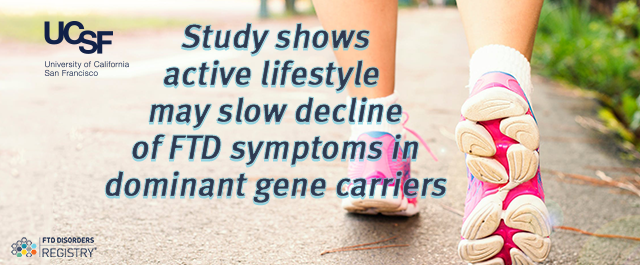PRESS & NEWS
A Healthy Lifestyle May Slow Familial FTD

Study suggests patients can influence outcomes despite a genetic diagnosis.
Study suggests patients can influence outcomes despite a genetic diagnosis.
New evidence now shows that a healthy lifestyle may play a protective role in frontotemporal dementia (FTD), even for people who have a genetic disposition for it. According to a study from the University of California, San Francisco (UCSF), a physically and mentally active lifestyle offers resilience to FTD disorders, possibly delaying the onset of cognitive decline or slowing the progression of symptoms.
Researchers at the UCSF Memory and Aging Center determined that higher physical and cognitive activity levels were associated with lower clinical disease severity in people who carry an autosomal dominant frontotemporal lobar dementia (FTLD, also called FTD) mutation. Autosomal dominant is a pattern of inheritance in which an affected individual has one mutant gene and one normal gene on a pair of autosomal chromosomes.
“FTD is a devastating disease without good medical treatments, but our results suggest that even people with a genetic predisposition for FTD can still take actions to increase their chances of living a long and productive life. Their fate may not be set in stone,” said Kaitlin Casaletto, Ph.D., assistant professor of neurology at the UCSF Memory and Aging Center and corresponding author of the study, which was published January 8, 2020, in Alzheimer's & Dementia: The Journal of the Alzheimer's Association.
There were 105 mutation carriers (C9orf72/MAPT/GRN) and 69 non‐carriers who participated in the study, which included longitudinal neurobehavioral assessments and brain magnetic resonance imaging (MRI) scans. Those with dominant, disease-causing genetic mutations were either symptomless or had experienced only mild early-stage symptoms. More active carriers “outperformed” brain volume, corresponding to a cognitive reserve hypothesis.
All participants underwent initial MRI scans to measure the extent of brain degeneration caused by the disease, completed tests of thinking and memory, and reported on their current levels of cognitive and physical activity in their daily lives, including reading, spending time with friends, jogging, etc. At the same time, their family members completed regular gold-standard assessments of how well the participants were functioning in their lives – managing finances, medications, bathing themselves, and so on. All of these measures were repeated at annual follow-up visits to track the long-term progression of participants’ disease.
Even after only two to three visits (one to two years into the study), Casaletto and her team had begun to see significant differences in the speed and severity of FTD disease progression between the most and least mentally and physically active individuals in the study, with mentally and physically active lifestyles showing similar effects across participants.
The researchers found that functional decline was 55 percent slower in the most active 25 percent of participants compared to the least active 5 percent.
“This was a remarkable effect to see so early on,” Casaletto said. “If this were a drug, we would be giving it to all of our patients.”
About 40 percent of people with FTD have a family history of the disease. Scientists have identified specific dominant genetic mutations that drive the development of the disease in about half of these cases. But even in these individuals, the disease can have very different courses and severity. Studies have shown that lifestyle, dietary habits, mental makeup, and even environmental factors along with the genetic factors affect aging and illness.
“There’s incredible variability in FTD, even among people with the same genetic mutations driving their disease. Some people are just more resilient than others for reasons we still don’t understand,” said Casaletto. “Our hypothesis was that the activities people engage in each day of their lives may contribute to the very different trajectories we see in clinic, including when the disease develops and how it progresses.”
This research aligns with long-standing findings which have shown that leisure activities, including exercise and cognitive fitness, prevent or slow Alzheimer’s disease. This was the first research to show how physical and cognitive activities relate to brain health in person’s with autosomal dominant FTD. These results just report a correlation and further study may show different causes.
“It is possible that some participants have less active lifestyles because they have a more severe or aggressive form of FTD, which is already impacting their ability to be active, Casaletto said. “Clinical trials that manipulate cognitive and physical activity levels in people with FTD mutations are needed to prove that lifestyle changes can alter the course of the disease.”
The researchers’ next step is to include more detailed and objective assessments of participants’ physical and mental activity, including fitting them with wearable activity sensors to assess how much activity is needed to promote cognitive resilience.
This study was part of the Advancing Research and Treatment in Frontotemporal Lobar Degeneration (ARTFL) and Longitudinal Evaluation of Familial Frontotemporal Dementia Subjects (LEFFTDS) studies and a Larry L. Hillblom Fellowship Grant.
Together we can find a cure for ftd
The FTD Disorders Registry is a powerful tool in the movement to create therapies and find a cure. Together we can help change the course of the disease and put an end to FTD.
Your privacy is important! We promise to protect it. We will not share your contact information.



